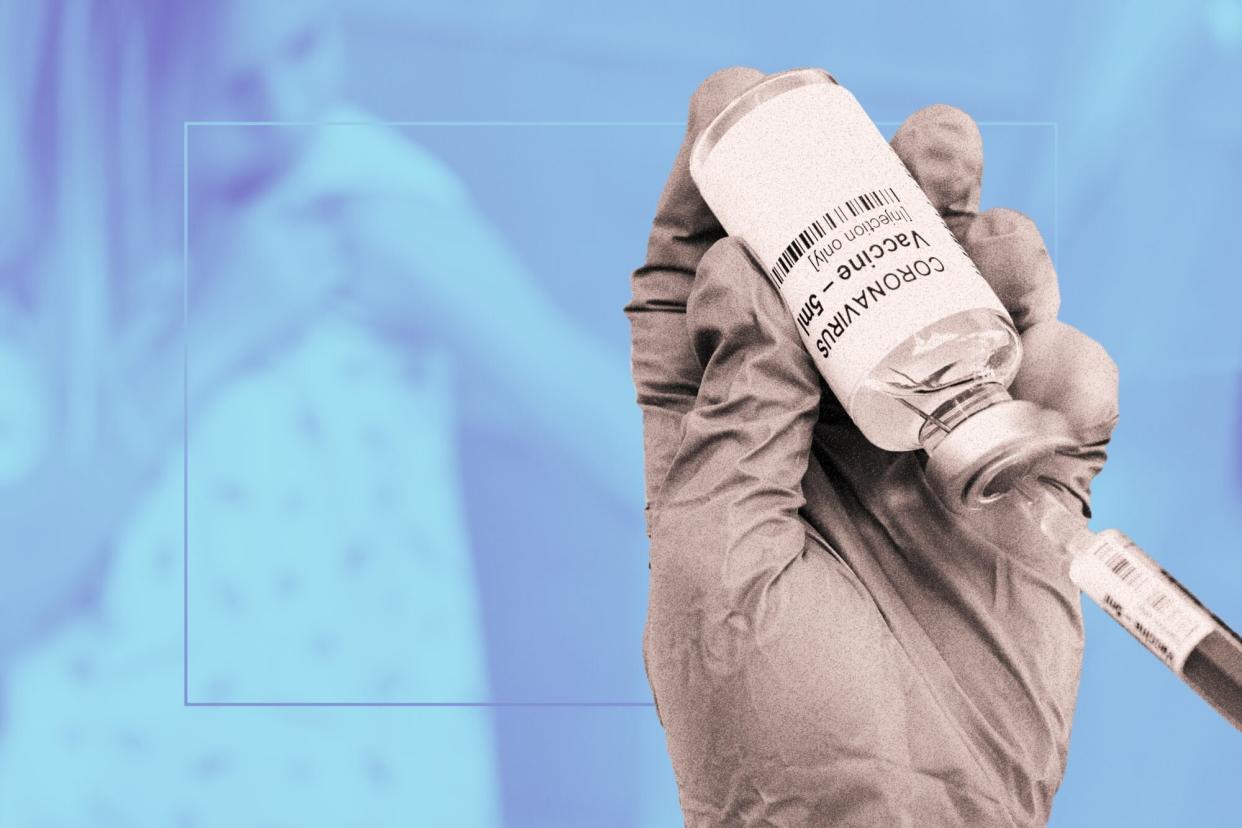A Pfizer COVID Vaccine May Soon Be Approved for Children Under the Age of 12

- Oops!Something went wrong.Please try again later.
Getty Images
September is here once again and with it, another school year impacted by the COVID-19 pandemic. Some students have returned to the classroom for in-person learning full-time, but there are still ongoing concerns about coronavirus infections, given how cases surged nationwide over the summer, according to data from the Centers for Disease Control and Prevention. Thankfully, there may soon be one potential bright spot for families with young children, who aren't yet eligible to receive the COVID-19 vaccine: Health officials have recently confirmed that the makers of the Pfizer-BioNTech vaccine are planning to seek approval for the two-dose shot for use for children between the ages of 5 and 11 within weeks.
In a recent interview with the German publication Der Spiegel, Özlem Türeci, M.D., chief physician of BioNTech, said, "we will be presenting the results of our study on the 5- to-11-year-olds to authorities around the world in the coming weeks" in order to gain approval. Dr. Türeci said the makers of the Pfizer-BioNTech vaccine are preparing to make smaller doses of the shot for children in the 5 to 11 age group as they anticipate formal approval, according to The New York Times. (Read more: How Effective Is the COVID-19 Vaccine?)
Currently, the Pfizer-BioNTech vaccine is the only coronavirus vaccine fully approved by the Food and Drug Administration for those age 16 years and older. The Pfizer-BioNTech vaccine is available for emergency use authorization for children between the ages of 12 and 15. This means, however, that children under the age of 12 remain vulnerable to potentially contracting the virus. (ICYDK: Doctors are also seeing a troubling surge of pregnant people falling ill with COVID-19.)
During an appearance Sunday on CBS' Face the Nation, Scott Gottlieb, M.D., former head of the FDA, said that the Pfizer-BioNTech vaccine may be approved for children between the ages of 5 and 11 in the U.S. by the end of October.
Dr. Gottlieb, who currently serves on Pfizer's board of directors, shared that the drug company will also have data from vaccine trials with children in the 5 to 11 age group by the end of September. Dr. Gottlieb also expects that the data will then be filed with the FDA "very quickly" — within days — and then the agency will decide whether or not to authorize the vaccine for children between the ages 5 to 11 within a matter of weeks.
"In a best-case scenario, given that timeline they've just laid out, you could potentially have a vaccine available to children aged 5 to 11 by Halloween," said Dr. Gottlieb. "If everything goes well, the Pfizer data package is in order, and the FDA ultimately makes a positive determination, I have confidence in Pfizer in terms of the data that they've collected. But this is really up to the Food and Drug Administration to make an objective determination." (Read more: Pfizer's COVID-19 Vaccine Is the First to Be Fully Approved by the FDA)
Testing is currently underway to determine the safety of the Pfizer-BioNTech vaccine for children between the ages of 2 and 5, with data on those results potentially arriving in early October, according to Dr. Gottlieb. Further, data on children between the ages of 6 months old and the age of 2 is expected sometime this fall.
With the latest developments on the Pfizer-BioNTech vaccine, you may be wondering, "what's going on with the other U.S.-approved vaccines?" Well, for starters, the New York Times recently reported that as of last week, Moderna had completed its trial study for children ages 6 to 11 years old, and is expected to file for FDA emergency use authorization for that age group by the end of the year. Moderna is also collecting data on children younger than 6 years old and expects to file for authorization from the FDA in early 2022. As for Johnson & Johnson, it has begun its phase three clinical trial in adolescents aged 12 to 17 and plans to begin trials on children younger than 12 years of age thereafter.
For parents who are understandably nervous about giving their children a brand new vaccine, Dr. Gottlieb recommends consulting with pediatricians, adding that parents are not facing a "binary decision" of whether or not to vaccinate their children against COVID-19. (Related: 8 Reasons Parents Don't Vaccinate (and Why They Should))
"There [are] different ways to approach vaccination," said Dr. Gottlieb on Face the Nation. "You could go with one dose for now. You could potentially wait for the lower dose vaccine to be available, and some pediatricians may make that judgment. If your child has already had COVID, one dose may be sufficient. You could space the doses out more."
That's all to say, "there's a lot of discretion that pediatricians can exercise, making largely off-label judgments, but exercising discretion within the context of what an individual child's needs are, their risk is, and what the parents' concerns are," says Dr. Gottlieb.
When the vaccine does become available for those under 12, consult with your child's doctor or medical personnel to see your options and best course of action for vaccinating your little ones against COVID-19.
The information in this story is accurate as of press time. As updates about coronavirus COVID-19 continue to evolve, it's possible that some information and recommendations in this story have changed since initial publication. We encourage you to check in regularly with resources such as the CDC, the WHO, and your local public health department for the most up-to-date data and recommendations.

